Overview
The rise in support for same-sex marriage over the past decade is among the largest changes in opinion on any policy issue over this time period. A new national survey finds that much of the shift is attributable to the arrival of a large cohort of young adults – the Millennial generation – who are far more open to gay rights than previous generations. Equally important, however, is that 14% of all Americans – and 28% of gay marriage supporters – say they have changed their minds on this issue in favor of gay marriage.
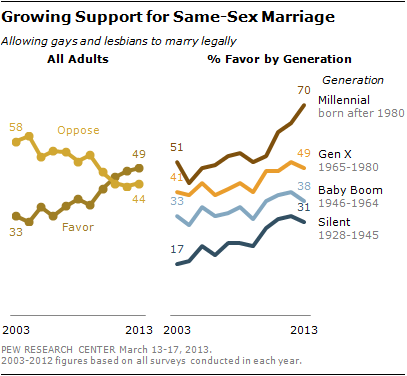
The long-term shift in the public’s views about same-sex marriage is unambiguous. Polling conducted in 2003 found most Americans (58%) opposed to allowing gays and lesbians to marry legally, and just a third (33%) in favor. The new survey by the Pew Research Center, conducted March 13-17, 2013 among 1,501 adults nationwide, confirms that these figures have crossed, with 49% supporting same-sex marriage, and 44% opposed.
Related
High Court to Hear Same-Sex Marriage Cases
Slideshow: Changing Attitudes on Gay Marriage
Interactive: Changing Minds: Behind the Rise in Support for Gay Marriage
The new survey finds 70% of “Millennials” – born since 1980 and age 18-32 today – in favor of same-sex marriage. That is far higher than the support among older generations. But two other factors also make the views of this group significant. Millennial support for same-sex marriage has grown substantially over the past decade, from 51% in 2003 to 70% today. And Millennials make up a larger share of the adult population today. In 2003, Millennials made up just 9% of the adult population. Today, 27% of adults are in the Millennial generation.
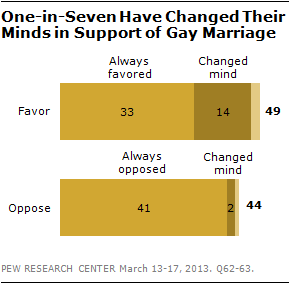
Support for same-sex marriage also has increased among older generations over the past decade. For example, in 2003, just 17% of those in the Silent generation – born between 1928 and 1945 – favored same-sex marriage; today 31% do.
To better understand this change, the new survey asked supporters of same-sex marriage if they have always held this view or if they have changed their mind on this issue. More than a quarter of same-sex marriage proponents (28%) say their views have changed. This represents 14% of the American public overall. By comparison, virtually everyone who opposes same-sex marriage – 41% out of 44% – say they have always been against it.
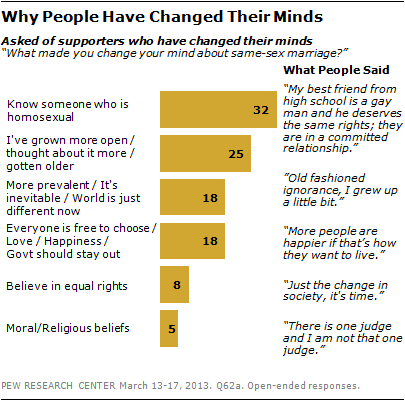
When those who say they have shifted to supporting same-sex marriage are asked why their views changed, people offer a range of answers. Roughly a third (32%) say it is because they know someone – a friend, family member or other acquaintance – who is homosexual. A quarter (25%) say that their personal views have changed as they have thought about the issue or simply because they have grown older.

About one-in-five (18%) say they changed their minds to support gay marriage because the world has changed and that this kind of shift is inevitable. The same percentage (18%) say they changed their minds because they think people should be free to choose what makes them happy and that they no longer think the government should be involved in people’s personal lives in this way.
Opinions about homosexuality and the possible impact same-sex marriage also have shifted substantially over the past decade. In 2003, as the debate over same-sex marriage intensified and Massachusetts became the first state to allow same-sex marriage, a 56% majority of Americans felt that allowing gays and lesbians to marry would undermine the traditional American family, while 39% disagreed. Today, 46% say same-sex marriage would undermine the traditional family while slightly more (51%) disagree.
Other trends have shown similar movement since 2003: The percentage saying same-sex couples can be as good parents as heterosexual couples has risen 10 points (to 64%) and there has been a comparable increase in the percentage saying that in general homosexuality should be accepted, rather than discouraged, by society.
Nonetheless, a majority of Americans (56%) continues to say that same-sex-marriage would go against their religious beliefs, though this percentage has declined by six points over the past decade.
Two-thirds of Americans (66%) agree that same-sex couples should have the same legal rights as heterosexual couples; just 30% disagree. Even among those who oppose allowing gays and lesbians to marry legally, a third (33%) say that same-sex couples should have the same legal rights as other couples.
More Say Homosexuality Should Be Accepted

The growing acceptance of same-sex marriage is occurring as broader attitudes about homosexuality are changing. Ten years ago, the public was evenly divided about whether homosexuality should be accepted (47%) or discouraged (45%) by society. Today, 57% say it should be accepted; 36% say it should be discouraged.
The partisan and demographic differences in opinions about societal acceptance of homosexuality are mirrored in attitudes related to same-sex marriage, including whether it would conflict with people’s religious beliefs and undermine the traditional family.
Younger generations, who were more accepting than older generations 10 years ago, have only grown more-so, while there is little change among their elders. Generational differences about homosexuality largely mirror attitudes about same-sex marriage, with about three-quarters of Millennials (75%) and 62% of Gen Xers now saying homosexuality should be accepted. Those in older generations are more divided.
While about two-thirds of both Democrats (66%) and independents (65%) now say homosexuality should be accepted, reflecting significant shifts towards greater acceptance among these groups, Republican attitudes are largely unchanged from 2003 (38% of Republicans say homosexuality should be accepted, 54% say it should be discouraged).
Most See Same-Sex Marriage in Conflict with Religious Beliefs
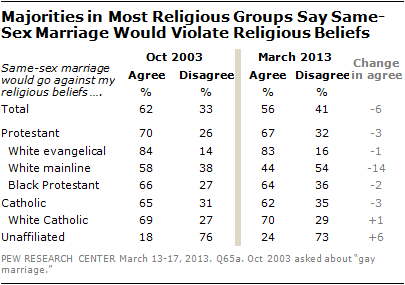
While public acceptance of homosexuality has increased, a majority of Americans (56%) agree that “same-sex marriage would go against my religious beliefs.” While this is down six points overall from 10 years ago, it has shifted little—and remains the majority position—among most religious groups.
White evangelicals overwhelmingly agree with this statement (83%), as do smaller majorities of black Protestants (64%), and white Catholics (70%).
Notably, white mainline Protestants are the only religious group that has changed substantially on this

question: In 2003 a 58% majority said gay marriage would go against their religious beliefs; just 44% say this today.
And the growth in support for same-sex marriage among mainline Protestants over this time is also substantial: Today 55% favor allowing gays and lesbians to marry, up from 36% 10 years ago. (Click the graphic for interactive trends on support for same-sex marriage across religious groups.)
Public Divided Over Impact of Same-Sex Marriage on the Family
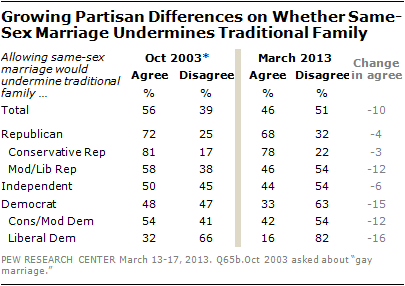
Shifting attitudes about homosexuality are also evident in public opinion about same-sex marriage and the traditional American family. In 2003, a 56% majority of Americans agreed with the statement: “allowing gays and lesbians to legally marry would undermine the traditional American family;” today 46% say this.
But partisan differences are substantial, and have grown in recent years. Just a third (33%) of Democrats now agree with the statement, while 63% disagree; in 2003 Democrats were evenly divided on this question. Republican opinions, in contrast, have remained more stable: 68% of Republicans say same-sex marriage would negatively impact the American family, little changed since 2003.

These partisan differences, both in current size and in trajectory, are similar to those seen in attitudes about same-sex marriage. Democratic and independent support for gay marriage has steadily increased over the last decade, while there has not been a commensurate shift in GOP opinion. (Click the graphic for interactive partisan trends on support for same-sex marriage.)
Majority Has Positive View of Same-Sex Couples as Parents
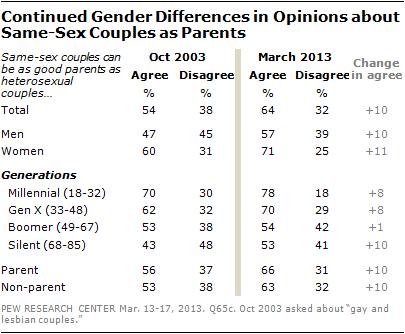
Americans have also become more accepting of same-sex couples as parents: 64% now agree that “same-sex couples can be as good parents as heterosexual couples,” up from 54% in 2003. As with other attitudes about LGBT (Lesbian, Gay, Bisexual, and Transgender) people, younger generations remain substantially more accepting—and have grown more so over time.

Gender gaps persist on this and other questions about homosexuality, including attitudes about same-sex marriage. While 71% of women say same-sex couples can be good parents, a smaller majority (57%) of men agree (click the graphic for interactive trends on support for same-sex marriage by gender). There are no substantial differences between parents and non-parents on this question.
Two-Thirds Favor Same Legal Rights for Same-Sex Couples
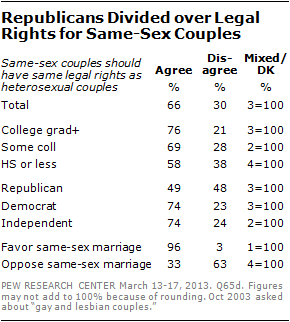
Two-thirds of Americans (66%) say they think same-sex couples should have the same legal rights as heterosexual couples; just 30% disagree.
Although majorities across all educational groups say gay and lesbian couples should be entitled to the same rights, support for this position increases with education: 76% of college graduates agree with the statement, compared with 69% of those with some college experience and 58% of those who have not attended college.
Partisan differences also are sizable in views of whether same-sex couples should have the same legal rights as heterosexual couples. Opinions among Democrats and independents are almost identical – 74% in both groups agree that same-sex couples should have the same legal rights as other couples. But Republicans are evenly divided – 49% say same-sex couples should have the same legal rights as heterosexual couples, while 48% disagree.
Nearly all (96%) of those who favor same-sex marriage favor the same legal rights for same-sex couples as heterosexual couples. Among those who oppose same-sex marriage, a third (33%) favor gay couples having the same legal rights as heterosexual couples while 63% are opposed.
Many Are Cross-Pressured over Same-Sex Marriage
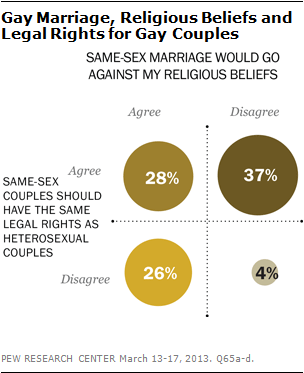
Most people (56%) say that same-sex marriage would conflict with their religious beliefs. Most (66%) also say that same-sex couples should have the same legal rights as heterosexual couples. Just over a quarter (28%) of Americans agree with both of these statements: that same-sex marriage conflicts with their religious beliefs and that same-sex couples should have the same legal rights as heterosexual couples.
This tension is particularly widespread among Catholics – 37% of Catholics say same-sex marriage goes against their religious beliefs while feeling that couples should have the same legal rights regardless of sexuality.
Among the 28% of the public who say that same-sex couples should have the same rights as others – but also say that same-sex marriage conflicts with their religious beliefs – opinion is divided over allowing same-sex marriage. While 46% favor legalizing same-sex marriage, 44% are opposed.
Question Wording and Support for Same-Sex Marriage

The rise in support for same-sex marriage has been confirmed by every major national survey organization tracking the issue. But the balance of opinion differs based on the wording of the question. The Pew Research Center question asks: “Do you strongly favor, favor, oppose, or strongly oppose allowing gays and lesbians to marry legally?” The March 13-17 survey finds 49% in favor and 44% opposed. A Washington Post/ABC News survey, conducted March 7-10, asks a different question: “Do you think it should be legal or illegal for gay and lesbian couples to get married?” This question has consistently elicited a higher level of support for same-sex marriage; the latest survey found 58% saying legal and 36% illegal.
These two surveys show that more Americans oppose making same-sex marriage legal (44% in the Pew Research Center poll) than favor making it illegal (36% in the Washington Post/ABC News poll). Both organizations have tracked their questions since 2003, and the Washington Post/ABC News poll has consistently found higher support for same-sex marriage. However, the two polls tell the same story: significant growth in support for same-sex marriage over the last 10 years.




